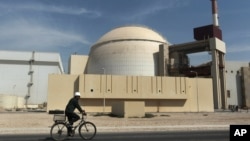The United States and other world powers are easing economic sanctions against Iran after international inspectors confirmed that Tehran has started to curb its most sensitive nuclear enrichment activity.
The International Atomic Energy Agency said Monday that Iran had disabled centrifuges at its Natanz and Fordow nuclear facilities that were used to enrich uranium to 20 percent. The cutback was part of a landmark November agreement Tehran reached with the world powers who are seeking to prevent it from obtaining a nuclear weapon.
The White House said it was "the first time in nearly a decade" that Tehran "has verifiably enacted measures" to trim its nuclear capability. It called the Iranian actions "an important step forward."
With the cutback confirmed, the U.S., Britain, France, Germany, Russia, China and the European Union eased economic sanctions against Iran, a package worth between $6 billion and $7 billion. It includes release, in several installments, of more than $4 billion in frozen overseas assets.
The Iranian nuclear cutback and the easing of sanctions that have crippled its economy set the stage for six months of talks between Tehran and the world powers to try to negotiate a long-term pact to keep Iran from obtaining a nuclear weapon.
The U.S. said it remained committed to "using strong and disciplined diplomacy to reach a peaceful resolution" of the talks with Iran.
The November agreement with the five permanent members of the U.N. Security Council and Germany limits Iran's enrichment to five percent, and requires the government to reduce its current stock of higher-enriched uranium.
The world powers have long feared that Iran is attempting to develop nuclear weapons, but Tehran insists its nuclear program is purely for generating electricity and carrying out medical research.
The International Atomic Energy Agency said Monday that Iran had disabled centrifuges at its Natanz and Fordow nuclear facilities that were used to enrich uranium to 20 percent. The cutback was part of a landmark November agreement Tehran reached with the world powers who are seeking to prevent it from obtaining a nuclear weapon.
The White House said it was "the first time in nearly a decade" that Tehran "has verifiably enacted measures" to trim its nuclear capability. It called the Iranian actions "an important step forward."
With the cutback confirmed, the U.S., Britain, France, Germany, Russia, China and the European Union eased economic sanctions against Iran, a package worth between $6 billion and $7 billion. It includes release, in several installments, of more than $4 billion in frozen overseas assets.
The Iranian nuclear cutback and the easing of sanctions that have crippled its economy set the stage for six months of talks between Tehran and the world powers to try to negotiate a long-term pact to keep Iran from obtaining a nuclear weapon.
The U.S. said it remained committed to "using strong and disciplined diplomacy to reach a peaceful resolution" of the talks with Iran.
The November agreement with the five permanent members of the U.N. Security Council and Germany limits Iran's enrichment to five percent, and requires the government to reduce its current stock of higher-enriched uranium.
The world powers have long feared that Iran is attempting to develop nuclear weapons, but Tehran insists its nuclear program is purely for generating electricity and carrying out medical research.





